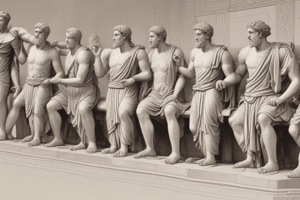Podcast
Questions and Answers
What shape did Aristotle believe the Earth and celestial bodies were?
What shape did Aristotle believe the Earth and celestial bodies were?
- Oval
- Sphere (correct)
- Triangle
- Square
What did Aristotle consider to be the perfect shape?
What did Aristotle consider to be the perfect shape?
- Circle (correct)
- Rectangle
- Square
- Triangle
What was the material that Aristotle believed made up the heavens?
What was the material that Aristotle believed made up the heavens?
- Water
- Fire
- Air
- Ether (correct)
Why did Aristotle believe the Earth was imperfect?
Why did Aristotle believe the Earth was imperfect?
What was one of Aristotle's arguments for the Earth being a sphere?
What was one of Aristotle's arguments for the Earth being a sphere?
Why did Aristotle believe that the Earth's component pieces would form a sphere?
Why did Aristotle believe that the Earth's component pieces would form a sphere?
Who is credited with being the first to propose that the Earth was round?
Who is credited with being the first to propose that the Earth was round?
What observation did Aristotle make about the stars in Egypt and Cyprus?
What observation did Aristotle make about the stars in Egypt and Cyprus?
What did Pythagoras use to support his idea of a spherical Earth?
What did Pythagoras use to support his idea of a spherical Earth?
What was the basis of Aristotle's argument that the Earth was a sphere?
What was the basis of Aristotle's argument that the Earth was a sphere?
What did Eratosthenes and Aristarchus do together?
What did Eratosthenes and Aristarchus do together?
What was the significance of Polaris in Pythagoras' idea of a spherical Earth?
What was the significance of Polaris in Pythagoras' idea of a spherical Earth?
What is the primary focus of astronomy as a science?
What is the primary focus of astronomy as a science?
What observation did Aristotle make during lunar eclipses to support a spherical earth model?
What observation did Aristotle make during lunar eclipses to support a spherical earth model?
What would a flat penny produce if rotated 90 degrees to the sunlight?
What would a flat penny produce if rotated 90 degrees to the sunlight?
What is the primary reason for the changing seasons on Earth?
What is the primary reason for the changing seasons on Earth?
Why does Aristotle's observation of lunar eclipses support a spherical earth model?
Why does Aristotle's observation of lunar eclipses support a spherical earth model?
What occurs when the Sun is at its closest point to the equatorial plane?
What occurs when the Sun is at its closest point to the equatorial plane?
At which point in their orbit do planets move the fastest?
At which point in their orbit do planets move the fastest?
What is the implication of observing the Pole Star's position in the sky during short travels northwards?
What is the implication of observing the Pole Star's position in the sky during short travels northwards?
What is the term for the greatest distance between a planet or other body and the Sun?
What is the term for the greatest distance between a planet or other body and the Sun?
How does the shape of a sphere differ from a flat penny in terms of shadow production?
How does the shape of a sphere differ from a flat penny in terms of shadow production?
What is the significance of observing similar curvatures during multiple lunar eclipses?
What is the significance of observing similar curvatures during multiple lunar eclipses?
Which of the following celestial bodies is closest to the Earth?
Which of the following celestial bodies is closest to the Earth?
What is the antumbra in a shadow?
What is the antumbra in a shadow?
What type of eclipse occurs when the Sun or Moon is completely obscured?
What type of eclipse occurs when the Sun or Moon is completely obscured?
What is the origin of the word 'planet'?
What is the origin of the word 'planet'?
Which planet is known as the 'Morning Star' or 'Evening Star'?
Which planet is known as the 'Morning Star' or 'Evening Star'?
What is a unique feature of Jupiter?
What is a unique feature of Jupiter?
How many confirmed moons does Saturn have?
How many confirmed moons does Saturn have?
Flashcards are hidden until you start studying




